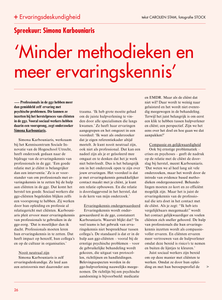Verpleegkundig specialisten (VS) hebben in Nederland, net als in andere landen, sinds enige tijd hun plaats veroverd in de gezondheidszorg. In de ggz komt de VS onder meer in aanraking met cliënten met een eerste psychose. In dit literatuuronderzoek is gekeken naar het effect van de interventies tijdens de eerste psychose en de rol van de VS daarbij.
LINK
Presentatie proactieve palliatieve zorg in de GGZ voor trainingsbijeenkomst 3
DOCUMENT

Bespreking van boek 'Professionele oordeelsvorming in het sociaal domein' van A. van Montfoort.
DOCUMENT

Doctoral thesis about the neural basis of emotion processing and regulation in groups at increased risk for psychosis.
LINK
A first episode of psychosis (FEP) is a stressful, often life-changing experience. Scarce information is available about personal preferences regarding their care needs during and after a FEP. Whereas a more thorough understanding of these preferences is essential to aid shared decision-making during treatment and improve treatment satisfaction. Methods: Face-to-face interviews with participants in remission of a FEP were setup, addressing personal preferences and needs for care during and after a FEP. The interviews were conducted by a female and a male researcher, the latter being an expert with lived experience. Results: Twenty individuals in remission of a FEP were interviewed, of which 16 had been hospitalized. The distinguished themes based on personal preferences were tranquility, peace and quietness, information, being understood, support from significant others, and practical guidance in rebuilding one's life. Our findings revealed that the need for information and the need to be heard were often not sufficiently met. For 16/20 participants, the tranquility of inpatient treatment of the FEP was pre-dominantly perceived as a welcome safe haven. The presence and support of family and close friends were mentioned as an important factor in the process of achieving remission.
MULTIFILE

Deze publicatie maakt deel uit van het RAAK project Who Knows?! De inzet van ervaringsdeskundigheid in de beroepspraktijk van geestelijke gezondheidszorg, verslavingszorg en maatschappelijke opvang.
DOCUMENT
Professionals in de ggz hebben meer dan gemiddeld zelf ervaring met psychische problemen. Die kunnen ze inzetten bij het herstelproces van cliënten in de ggz. Vooral sociaal werkers hebben daarin een voorsprong, zegt onderzoeker Simona Karbouniaris
DOCUMENT

Recensie van Anouk Bolsenbroek en Douwe van Houten - Werken aan een inclusieve samenleving. Goede praktijken
DOCUMENT

Kwetsen en mensenrechten schenden zoals het kabinet dat doet, botst met alle professionele waarden van het sociaal werk, schrijft docent-onderzoeker Jeroen Boekhoven. Niet de individuele sociaal werker, maar de beroepsgroep als geheel moet stelling nemen, meent hij.
LINK
Victim-offender contact has been studied extensively in prisons, but research on contact between victims and mentally disordered offenders in forensic mental health settings is lacking. Therefore, an exploratory study was conducted on contact between victims and offenders in four Dutch forensic psychiatric hospitals. These offenders have committed serious (sexually) violent offenses, for which they could not be held fully responsible due to severe psychopathology. During the mandatory treatment, it is possible for offenders and their victims to engage in contact with each other if both parties agree to this. To explore the conditions under which this contact is suitable, we interviewed 35 social workers about their experiences in 57 cases from four Dutch forensic psychiatric hospitals. Findings demonstrated that, according to the social workers, no type of offense or psychopathology were obvious exclusion criteria for victim-offender contact. Social workers described offenders' problem awareness, stable psychiatric condition, and ability to keep to agreements as important factors that enable victim-offender contact. Implications and suggestions for future research are provided.
DOCUMENT
